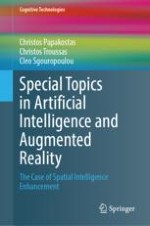2024 | OriginalPaper | Buchkapitel
3. AI-Driven and SOLO-Based Domain Knowledge Modeling in PARSAT AR Software
verfasst von : Christos Papakostas, Christos Troussas, Cleo Sgouropoulou
Erschienen in: Special Topics in Artificial Intelligence and Augmented Reality
Verlag: Springer Nature Switzerland
Aktivieren Sie unsere intelligente Suche, um passende Fachinhalte oder Patente zu finden.
Wählen Sie Textabschnitte aus um mit Künstlicher Intelligenz passenden Patente zu finden. powered by
Markieren Sie Textabschnitte, um KI-gestützt weitere passende Inhalte zu finden. powered by
